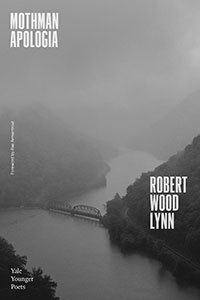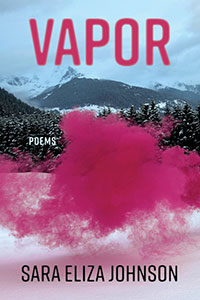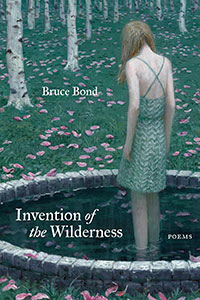 print preview
print previewback BLACKBIRD EDITORS
Recommendations & Reviews
This fall, the Blackbird editors present reviews and recommendations of books that have
been especially striking lately, from Robert Wood Lynn’s profound and atmospheric debut
collection Mothman Apologia, to Sara Eliza Johnson’s vulnerable and visceral second
collection of poetry, Vapor, to Bruce Bond’s incisive, heartfelt twenty-eighth collection
of poetry, Invention of the Wilderness.
Mothman Apologia by Robert Wood Lynn | Review by Danielle Kotrla
Yale University Press, 2022
 |
In “Coming To,” a poem midway through Robert Wood Lynn’s debut collection Mothman Apologia, the speaker recalls, “The mouse I named / so someone would stop asking me to kill it.” This idea of naming and making personal and, thus in a sense, making part of the self, scales up to the larger preoccupations of the collection. Lynn is importantly direct in naming these concerns—the tension between the ecological and the industrial, and how this tension plays out in real and devastating ways in the Virginias. And while these poems do have an elegiac quality, this lament is complicated by the idea of apologia. Here, the concern lies in the justification and defense of belief in a place and in the people who inhabit it. Famously, in Plato’s Apology, Socrates pleads, “Let me tell you a passage of my own life,” and in these poems, it is not difficult to imagine the Mothman making a similar appeal.
An epistemic question lies at the heart of this collection and these poems: what are alternative means of knowing a place, and what is the importance of these different forms of knowledge? In “(The Mothman Pronounces Appalachia),” the Mothman takes up the issue of Appalachia’s pronunciation and defends it—specifically defending the existence of the “latch” in the word. But it’s more than just pronunciation that’s at stake in the poem and alongside the Mothman appear references to Hades, Orpheus, and Eurydice. This poem, and the cycle of Mothman poems in general, speak to the importance of mythology to place, and how, even though their existence is perhaps doubted, these myths give people a way of protecting and defending a genus loci that those beyond it threaten when they try to “correct” the record. As the Mothman states later in the poem, “I am trying. I am trying to understand why // no one asks to understand mothpeople when all we wanted was / a warning.” There’s an underlying sense of desperation in the poem, and this desperation, I believe, is central to knowledge-making, as well as to the different ways we attempt to create knowledge and history within a place when it is threatened by those who have not experienced it and still want, despite this ignorance, to insist that they have the means of “fixing it.”
Along with these epistemological concerns, what I found most compelling about this collection was the use of juxtaposition. At times surprising and delightful and, at others, sobering and melancholic, Lynn sets elements of history and ordinary life against each other in ways that ask the reader to think of how circumstance, time, and space shape the elements of our lives. There is a powerful series of elegies for fire and oxycodone, but there are also poems such as “Walking Blues Not Packaged for Individual Sale,” where the expectations of the kind of person the speaker assumes himself to be—“Back when I still thought of myself / as the kind of friend who would visit you in jail”—are set against the expectations of a friend for whom the knowledge of what can be gained by stealing changes the trajectory of his life. Though the juxtaposition here is perhaps not as dramatic as that which takes place at other points in the collection, I found this to be one of the most striking instances. This is an example of a moment where not only are two individuals’ choices juxtaposed, but that of a temporally extended speaker, the present self juxtaposed against the past. The form of the poem, with its consistent indention, compliments this—these two lives, and the past and present iterations of them—by showing how the two are separate, yet inextricably intertwined.
At its core, Mothman Apologia is a collection that exemplifies care—from its thoughtful pacing and smart bracketing to its forceful and effective breaks—yet pushes the boundaries of containment, such as the existence of the eleventh of ten elegies, showing us that we often underestimate, for better or worse, what a place can hold. It is an exciting and stunning debut, one that reminds me to be open to new and strange ways of knowing, that doing so is a kindness, and ultimately, “Another thing I could give away without having any less.”
Robert Wood Lynn is the author of Mothman Apologia (Yale University Press, 2022). His writing has appeared in Blackbird, Michigan Quarterly Review, New Ohio Review, The Yale Review, and other journals, as well as included in the forthcoming Southern Poetry Anthology: Virginia.
~
Vapor by Sara Eliza Johnson | Review by Rebecca Poynor
Milkweed Editions, 2022
 |
Sara Eliza Johnson’s second collection, Vapor, comprised of a constellation of illuminating lyric poems, marries a poetic voice to a thread of scientific investigation to provide a structure and engine for this book. Johnson finds sources within the shadowed darkness of the cosmos and propels readers with striking and visceral images of a body and the universe it occupies. These poems address the macro with a microscopic lens as Johnson connects the body of the speaker with a cascade of scientific facts and ideas: an oyster pearl becomes a tumor, a memory becomes a cutting tooth, shame gains an anatomy, a viper is a heart.
In these poems, the speaker searches for security within a body and universe defined by their instability. Just as Johnson does for readers, the speaker of these poems finds a grounding in what can be revealed in the scientifically definable. The speaker finds stability, but, perhaps more importantly, they find comfort in the often-brutal science that makes up a volatile universe. In the poem “Legend,” Johnson writes, “Sometimes the horrors of the world amaze me.” Later on in “Legend,” after describing prehistoric infectious viruses found in meltwater, Johnson writes, “From this you learn we’re never safe / but maybe it means we’re never alone. // Under a microscope, the bacteria in me moves.” As often as the poems look outward, they turn inward.
Just as the speaker searches for stability within the universe, they also search desperately within it for connection and love, which seems to primarily be a desire for the acceptance that accompanies it. In “Revelation,” Johnson writes, “ . . . teach me how to move / through their darkness. I’d feed my heart // to a snake if it would show me how to change / skins, how to survive as an unlovable thing.” Johnson’s speaker does not hide in vulnerability, but instead shows it plainly to the reader, admitting that unquenchable desire for connection. But despite this vulnerability, Johnson maintains a distance between the speaker and her reader. In “Revelation,” Johnson addresses the reader directly. However, rather than addressing the reader as the familiar “Reader,” Johnson writes, “Stranger, I’d even lie / down for the axe if it could make me new.” In this vital moment, Johnson shows that though the speaker is consistently open about their desperation for connection, it has still not been achieved, not even through the act of writing these poems.
At the core of this book, in the midst of all the science and intricate language, is a deeply vulnerable speaker. While these poems are full of compelling images, and each one stands as an engaging and deft lyric, it is the vulnerability of Johnson’s speaker that maintains a striking balance with the omnipresent scientific grounding. In the penultimate poem, “Migration,” Johnson writes, “ . . . as dark that learns to love itself, / as cloud tissue, as the black glue that holds / each thing together, though light would separate it.” Much of the book is embedded in the shadows of the universe—the cool-dark of the ocean, the emptiness of a black hole, the speaker’s own shadows—but, instead of leaving readers with a bright ending, the speaker refreshingly remains in the darkness. However, crucially, the darkness has come to find acceptance within itself.
Sara Eliza Johnson is the author of Vapor (Milkweed Editions, 2022) and Bone Map (Milkweed Editions, 2014). Her poetry and nonfiction have appeared or are forthcoming in the Boston Review, Copper Nickel, New England Review, Best New Poets, DIAGRAM, among others, as well as the anthologies Read Women and February, and has been featured on Poetry Daily, Verse Daily, and the Academy of American Poets Poem-A-Day series.
~
Invention of the Wilderness by Bruce Bond | Review by Waverley Vesely
Louisiana State University Press, 2022
 |
Bruce Bond’s Invention of the Wilderness, his twenty-eighth book, raises questions, both psychological and philosophical, that are deployed to examine the role of naming in our interactions with reality, the earthly and mental existences of nature, and the decay of a stable sense of being—themes that recur through the images of Bond’s poems. The relationship between humans and the environment is understood as a textual relationship at its heart, and revisions of language redirect perception as much as physical engagement with the natural world. As is often the case in Bond’s work, the poems are not only profoundly human but also unwaveringly intelligent.
The word invention in the title signals that the poems are not only concerned with the concrete state of the environment and its destruction but also the way we craft an abstract understanding of nature deeply embedded within our own identities and perceptions. In “Arrow,” one of two long poems that constitute much of the body of this collection, Bond writes “By wilderness // betrayed, invited. Pinned / to a world I have no words for.” The speaker is suspicious of the neutrality of language, its capacity for incapacity, and the multiplicity of meanings in connection—whether internal or external. The speaker confronts the death of his mother and memories of learning language from her, saying “She who gave me language gave me this. // The smoke of mouths / speaking in the cold.” In this series of becomings, the speaker signals both the symbolic weight of grief manifested in language and the interpretive process of representing emotions in natural imagery. This deftly establishes a parallel between the slow death of the speaker’s mother and the slow death of the speaker’s wilderness, of the Earth.
The experience of grief, however, is partnered with the speaker’s need to understand the function of language in life. “It makes the sound // of wind and leaves. In each / the name for the other, the silence of both.” Bond’s reference to sound in the act of naming incisively directs attention to the name as an invented method of understanding, each sound, each word capable of eclipsing another. In the midst of grieving, the speaker questions the realness of meaning as something inherited and the loss of stability in that system of meanings when paired with the irreparable loss of the person who gave meaning to those words. “Long ago, my mother repeated the question: / but what if it is // nothing. And I heard no thing / in nothing. And I said something // I did not quite believe.” Bond takes care to avoid the nihilism that commonly makes its way into a recognition of the madeness of language; instead, he notes the evolving, generative nature of language—a wilderness of its own.
The questions that arise in “Arrow” transition seamlessly into the concerns of the title poem, “Invention of the Wilderness,” which investigates not only what it means to live in a dying environment but what it means to have and continue participating in making meaning for that environment. The speaker says “I was the maker of birds and so I called / them in a language I did not speak. // I worked night and day until the one / was the other, because I had the power.” While Bond gestures at the power dynamic inherent to the act of naming, the poem is more concerned with the nuanced realization that naming and renaming alters perception of the same physical objects—birds or otherwise—with the invented-ness of the wilderness and the self in language. The speaker continues “I is not an I, I read. And never nothing, / I add, come nightfall, but some stained / glass of dust and tears before we name it.” Bond adeptly notes the need to name as a way to give definition to being while he maintains an awareness of the instability bound to a name’s meaning.
Despite the gravity of ideas addressed in the poems of Invention of the Wilderness, they tend toward the hopeful, looking toward the possibility of a future where we participate in “a truer conversation // that listens close, the way a singer must / when a bird in the back of the room calls.” The final lines of Invention of the Wilderness carefully focus our attention on the hopefulness of the collection, suggesting new life can be made of a world thought to be lost: “You were a traveler / and carried your guitar like a language. // We were all there together. Remember. / You opened your case and birds flew out. // And the stretch of sky we took for dead / launched a thousand candles in the dark.” Death becomes a making, an invention of a new wilderness—one that recognizes the tensions of language and the multiplicity of being, and welcomes those with a dialog as attentive and discerning as Bond’s poems. ![]()
Bruce Bond is the author of thirty-two books including, most recently, Scar (Etruscan Press, 2020), Behemoth (Criterion Books, 2021), The Calling (Parlor Press, 2021), Patmos (University of Massachusetts Press, 2021), Liberation of Dissonance (Schaffner Press, 2022), and Invention of the Wilderness (Louisiana State University Press, 2022). His work has appeared in numerous journals and anthologies, including seven editions of Best American Poetry.